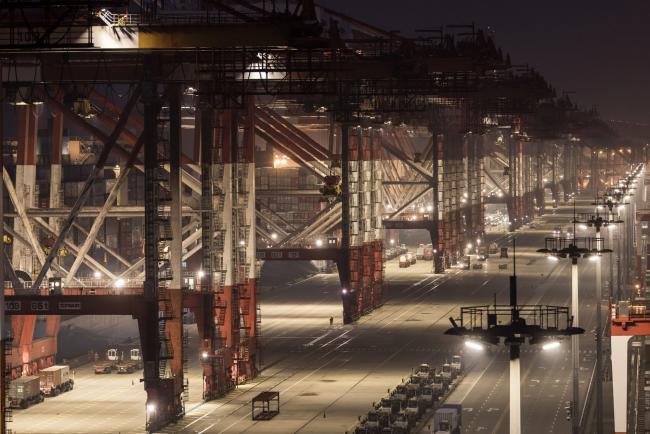(Bloomberg) -- Want to receive this post in your inbox every day? Sign up for the Terms of Trade newsletter, and follow Bloomberg Economics on Twitter for more.
The economic fallout of President Donald Trump’s trade war is becoming easier to see. The endgame — not so much.
U.S. financial markets are sputtering, the outlook for U.S. farm exports is worsening and a key gauge of American manufacturing just unexpectedly contracted for the first time in three years. The next victim of tariffs on Chinese goods may be consumer spending, which accounts for about 70% of America’s economic activity.
As Americans face the prospect of higher prices, it seems like a good moment to take a hard look at what exactly Trump is demanding from China. He often says he’s using tariffs to fight for farmers and factory workers. But the dispute at its core is over something much more difficult to achieve than convincing Beijing to buy some soybeans or incentivizing a U.S. factory to leave China for Vietnam.
Last week, the U.S. Trade Representative offered a timely reminder of what it argues are the key Chinese violations at the heart of Trump’s trade war. In a little-noticed World Trade Organization legal brief filed in the midst of the latest volley of import taxes, USTR listed the following alleged Chinese abuses:
Charting the Trade War
Hopes of finishing a monster Asia-Pacific trade pact by year’s end may be headed for disappointment again. After seven years, talks have been mired in disagreements around how to regulate e-commerce and labor migration, among other issues. Now, under the weight of trade-war pressures, regional trade spats and a global economic slowdown, a November deadline is looking less realistic.
Today’s Must Reads
- Storm tracker | A gauge of the U.S. export outlook has plunged to the most dire spot on Bloomberg’s Trade Tracker as the economic fallout from the trade war widens.
- Recession course | The U.K. may be headed for its first recession since the financial crisis after Brexit uncertainty hobbled the nation’s services industries more than expected.
- Early frost | The Bank of Canada is expected to open the door further to interest rate cuts amid worries U.S.-China tensions will curb a relatively robust expansion at home.
- Consumer drivers | JPMorgan Chase (NYSE:JPM) says global retail sales rose 4.8% last quarter, buoyed by still-tight labor markets. But a factory slump may change that.
- Brexit divisions | U.K. Prime Minister Boris Johnson began moves to trigger a snap election after a humiliating defeat for his EU exit strategy left his ruling party in tatters.
- Car wars | Trump can’t withhold auto tariff report, conservative group says in lawsuit.
- Rubber match | Lowered anti-dumping duties on imports of certain off-the-road tires from China were upheld by the U.S. Court of International Trade.
- Sept. 6: France trade balance
- Sept. 8: China trade balance
- Sept. 9: Germany, Taiwan, U.K. trade balances
Don’t keep it to yourself. Colleagues and friends can sign up here. We also publish Balance of Power, a daily briefing on the latest in global politics.
For even more: Subscribe to Bloomberg All Access for full global news coverage and two in-depth daily newsletters, The Bloomberg Open and The Bloomberg Close.
How are we doing? We want to hear what you think about this newsletter. Let our trade tsar know.
